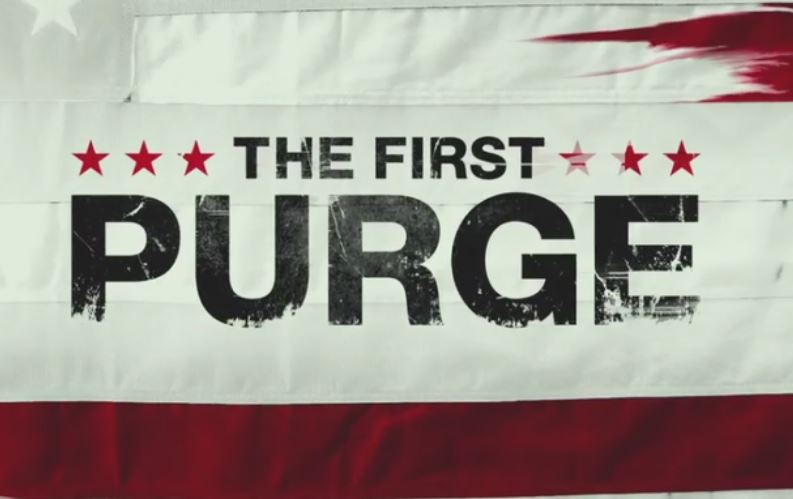"The First Purge" - Review

Is there any film franchise with a greater uptick in quality than The Purge series? It’s been fascinating to watch these films grow and get better with each successive entry. The first film, simply titled The Purge introduced the world to the loopy Twilight Zone-esque concept – in the indeterminate future, the United States government has been taken over by the draconian New Founding Fathers, who have implemented “the Purge,” one night of the year where all crime, including murder, is legal. The rationale for this being that if citizens are allowed to let off pent-up rage it will alleviate many of the social problems of the country. While that rationale doesn’t make a ton of sense, the films explore human nature in much the same ways that dystopian novels like The Most Dangerous Game, Lord of the Flies, Battle Royale and The Hunger Games have done for generations.
The first film squandered its concept on a simple home invasion thriller, as seemingly random invaders terrorized an upper middle class white family. The two sequels The Purge: Anarchy and The Purge: Election Year took the concept and gave a John Carpenter-esque spin to the proceedings, even including a Snake Plissken type character played by Frank Grillo. The sequels explored how lower class and marginalized people dealt with The Purge, and both films were an angry middle finger to the government that exploits its people. This brings us to the fourth installment – The First Purge, a prequel that extends an even angrier middle finger toward the government.
A decade or so before the events of the other Purge films, the new political party the New Founding Fathers of America (NFFA) has come into power in the U.S. government on a wave of anxiety based around societal ills. A helpful opening news montage lays out that the United States has been devastated economically, anti-immigration sentiment is at an all-time high, and there’s been an opioid epidemic ravaging the country (you know, science fiction stuff). The NFFA have hit on a solution to everyone’s problems – the Purge – a way for citizens to release their pent-up anger and frustration for 12 hours, where any crime goes. The architect of this is a social researcher played by Marisa Tomei, who along with the Chief of Staff (Patch Darragh), has chosen Staten Island to run an experiment to see if the Purge will work for the rest of the country. The film then splits itself into two plotlines – one following Marisa Tomei’s character as she monitors the experiment, and the other following the residents of Staten Island, such as siblings Nya (Lex Scott Davis) and Isaiah (Joivan Wade) and drug kingpin Dmitri (Y’Lan Noel), as they either participate or fight for survival. And like the other Purge sequels, these characters eventually come together to fight back against a government that is trying to systematically oppress them.
There are many things to like about The First Purge. The biggest is that the characters all feel like real, relatable people, something the other Purge films don’t really do outside of Frank Grillo and Elizabeth Mitchell. Lex Scott Davis channels righteous fury and compassion, and you are actually worried for her and her brother. The real standout, however is Y’Lan Noel, who, judging by his work here, is destined to be an action star. He’s stoic and totally badass. Marisa Tomei is clearly having fun as a no-nonsense scientist who’s only interested in “the data,” and uncovers a secret about the Purge, but ultimately the story doesn’t give her a lot do.
Director Gerard McMurray, working from a script by series creator James DeMonaco, doesn’t glorify the action or hyper-violence like you’d expect in a high-gloss exploitation film; instead he presents violence as disturbing and horrifying. This only adds to how angry this movie feels. A particularly disturbing image is a group of masked police officers brutal beating a black to death on a baseball field. No one ever accused these movies of being subtle.
The problem with the film is its framing as a prequel. The story pays lip service to this being the first Purge – but how this insane law came to be isn’t explored. Instead The First Purge feels like just another Purge movie. Maybe the law will be explored in depth in the upcoming TV series, simply titled The Purge (the trailer for which plays halfway through the credits). But that’s a minor quibble; again the characters make this one of the better entries in the series.
If you like hyper-violent allegories, you can’t go wrong with The First Purge.
Three stars out of four.
 WhoRepresents.com is safe & secure
WhoRepresents.com is safe & secure